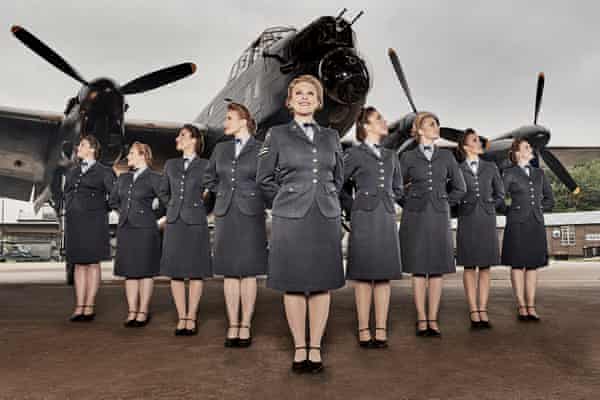Lynn Who Sang Well Meet Again Crossword
F rom Captain Tom Moore's chart-topping You'll Never Walk Alone to Katherine Jenkins' clemency take on Vera Lynn's We'll Meet Again – a comprehend version as grey and sickly equally 1940s rationed margarine – 2020 has been a year in which we've been reminded, more than ever, that British culture is unable to escape the long shadow of the second world war.
It was during that war that the beautiful Nosotros'll Meet Again, all soaring optimism and poignant nostalgia, became one of the kickoff great pop hits. It had a profound affect on the servicemen who, in a 1940 take on contemporary fandom, voted Vera Lynn their favourite musical artist. The 16m-Spotify-streams incarnation version we know best today is slightly different from the 1939 original, which began with a simple scale and the line: "Permit's say goodbye with a smile, dear." This was eventually edited into a perfect three-minute popular song, instantly recognisable from the Roland Shaw Orchestra's swinging intro, with the main lyric coming in before the x-2nd mark. In this simplification, in that location's an echo of how the meaning of the song has evolved over the decades.
Like all perfect popular songs, We'll Run across Again became something more than itself. Information technology undoubtedly meant and then much to millions of women and men, uniformed or in civvies, as they faced situations that are unimaginable to us even today. That about popular version of the song is redeemed in the deeply affecting department in which Lynn's phonation is joined past a massed choir of servicemen.
Yet as the generation who fought the war accept died, and so a romantic view of the conflict has become weaponised in the construction of the myth of a plucky Great britain, fighting alone against Nazi foes. Britain in 1940 wasn't lone at all, with the resources of an empire behind it, only that hardly serves the war-evoking narrative that formed the core of so much discourse effectually Brexit and today'due south civilization war. The examples are numerous: Matt Hancock, now the United kingdom'south bumbling health secretary, invoked D-mean solar day in a speech to launch his bootless Tory leadership campaign, and on "Brexit day" in January the Daily Mail printed a forepart folio image of Dover'south white cliffs, immortalised in another of Vera Lynn's wartime hits. In recent weeks, the tediously polarised statement over Churchill's legacy has get tied upwardly with discussions over monuments to our imperial past.
This jingoism has oftentimes been deployed as a smokescreen for government ineptitude over coronavirus and Lynn, the "forces sweetheart", hasn't been allowed. On 28 May, the Dominicus published a forepart page with the headline "Ale Meet Once more" above a motion picture of Boris Johnson brandishing a pint. On the same twenty-four hour period, it was announced that the official decease toll from Covid-19 had reached 37,837 – more than the number of Londoners killed by High german activeness in the entire second earth war.
I wonder now, reflecting on Vera Lynn's life, if she was always entirely comfortable with the vocal that followed her through to the cease of her 103 years. After all, when she appeared on the Morecambe & Wise 1972 Christmas special (and Morecambe got her confused with Gracie Fields), she refused to sing. Every bit comedian Barry Cryer after recalled, Wise said: "Vera doesn't know we want her to sing. How can nosotros go her to sing?" with Morecambe replying: "Short of starting another war, I've no idea." A comedy sketch, yes, but inside it there might prevarication a kernel of truth. For Lynn, and for United kingdom, the war was never over.

In 1952 she became the kickoff Briton to have a United states of america No 1 with Auf Wiederseh'n, Sweetheart; 30 years later her single I Dear This Land was released when martial fervour was in one case again stoked by the Falklands war. In 2009, every bit Great britain reeled from austerity, she became the oldest living person to have a No 1 album with a compilation of her hits called, of course, Nosotros'll Run across Again. As the UK thrashed around in post-Brexit turmoil in November 2018, the choral grouping D-Twenty-four hours Darlings – finalists on Britain's Got Talent – reached No 5 with an album featuring a encompass of We'll Meet Once again, illustrated the singers dressed in 1940s RAF uniforms. Any honouring of the dead had tipped into a tacky, cornball martial fetish.
Throughout her postwar career, Lynn's fame was trapped in symbiosis with the anxiety of a nation in decline, forever doomed to wait into the past, to the time when Great britain had its "finest hr". Coincidentally, her death comes eighty years to the mean solar day since Churchill made the speech in which he coined that term.
Popular equally expert as We'll See Over again will always have a presence – information technology provides gravitas to whatever crusade. Possibly the most powerful use of the song is in Stanley Kubrick's ever-timely Dr Strangelove, when in the final scene it drifts out, with savage irony, across a globe disappearing into diminutive fire. The version used by Kubrick too features a soldiers' chorus and as I listen to it now, I think not just of the long life of Vera Lynn, but those millions of men and women from Great britain and across to whom information technology gave so much hope, and whose memory we now see beingness so terribly abused.
campbellaunuentid.blogspot.com
Source: https://www.theguardian.com/music/2020/jun/18/well-meet-again-vera-lynn-pop-masterpiece-second-world-war
Postar um comentário for "Lynn Who Sang Well Meet Again Crossword"